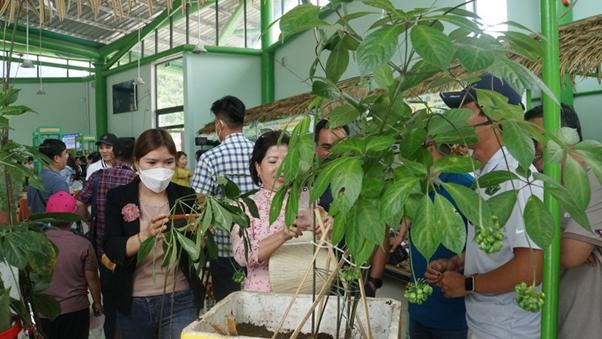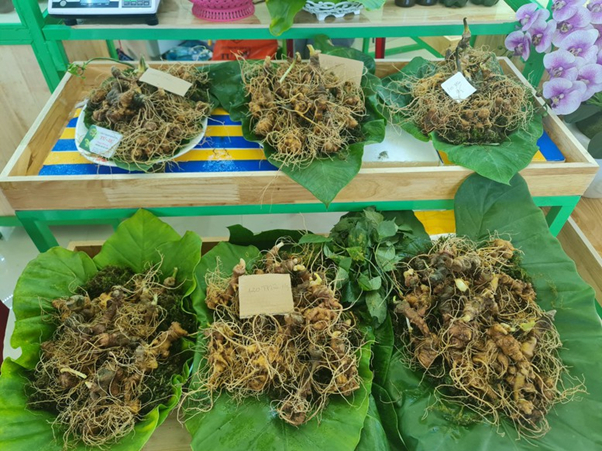November 26, 2025 | 12:55 GMT +7
November 26, 2025 | 12:55 GMT +7
Hotline: 0913.378.918
November 26, 2025 | 12:55 GMT +7
Hotline: 0913.378.918

Ngoc Linh ginseng plants are sold at the monthly market organized by the People's Committee of Nam Tra My district. Photo: VGP/Nhat Anh.
According to the Quang Nam Provincial Party Committee, to date, the total area of medicinal herbs growing in the province has reached about 9.610 hectares.
Specifically, the area planted with Ngoc Linh ginseng is more than 1.243 hectares, cinnamon 5.993 hectares, Paris polyphylla Smith nearly 2.201 hectares, Morinda officinalis nearly 151 hectares, campanula 186 hectares, amomum 36 hectares, polyscias fruticosa 42 hectares, tea tree 13 hectares.
In 2023, the province planted 561 hectares with main tree types: 258 hectares of cinnamon, 253 hectares of Ngoc Linh Ginseng, 66 hectares of campanula, and 24 hectares of Morinda officinalis.
Regarding the development of Ngoc Linh ginseng, the province has promulgated a project to implement the Vietnam Ginseng Development Program to 2030, with a vision to 2045.
There are currently two key units carrying out the task of preserving and developing Ngoc Linh ginseng: Ngoc Linh Ginseng Development Center, Nam Tra My district, with a ginseng garden scale of 3.5 hectares with about 17,392 plants from 2-7 old; Ngoc Linh Ginseng and Medicinal Development Center has a ginseng garden of 8.5 hectares with a cumulative total of about 241,561 plants of many ages. Currently, the two units are planting new trees and expanding the area of conservation gardens.
To develop products from Ngoc Linh ginseng, in recent times, the authorities of Quang Nam province have researched and applied breeding technologies to improve the rate and quality of Ngoc Linh ginseng seedlings; experimental production of tea bags and nutritious drinks from Ngoc Linh ginseng; research on the preparation and evaluation of the safety and effectiveness of Ngoc Linh ginseng soft capsules; registered and protected Ngoc Linh geographical indication for root ginseng products.
Regarding the development of Tra My cinnamon, Quang Nam province has issued a mechanism to support the conservation and development of Tra My cinnamon trees as well as implementing it in the districts of Nam Tra My, Bac Tra My, Tien Phuoc, Phuoc Son.
By 2025, the province will develop and stabilize raw material areas with Tra My cinnamon area reaching 7,777 hectares; in the period 2025-2030, 2,223 hectares will be planted, bringing the total area to 10,000 hectares.
In addition, the province supports seedlings for intercropping about 368 hectares (in Nam Tra My district). Thereby, people can increase their income, contribute to protecting forests and ecological environment, and socio-economic development of the province.
The development of Ngoc Linh ginseng and other medicinal plants contributes to improving farming techniques and, production along with protecting the forest environment and ecological environment, limiting deforestation for farming. Since then, the structure of crops with high economic value has gradually changed and formed a concentrated medicinal plant production area, with the nature of commodity production. Thereby, effectively promoting the local potential and strengths, increasing people's income.

Quang Nam province promotes the development of Ngoc Linh ginseng with high economic value in mountainous areas - Photo: VGP/Nhat Anh.
Mr. Ho Quang Buu, Vice Chairman of the People's Committee of Quang Nam province, said that with the potential and favorable conditions to develop the pharmaceutical industry, on March 27, 2022, during a working session with Quang Nam province, Prime Minister Pham Minh Chinh agreed to assign the Ministry of Health and Quang Nam province to research a project to develop and form a pharmaceutical industry center in Quang Nam province.
Immediately after the policy, Quang Nam province coordinated with the Ministry of Health to develop a project to submit to the Government for approval. The goal of the project is to form a pharmaceutical industry center in Quang Nam, then become the country's center for processing medicinal herbs into a high-value commodity production industry that is competitive in the domestic and world markets.
By 2035, the province will increase the area of medicinal herb growing areas to 30,000 hectares (of which Ngoc Linh ginseng is 15,568 hectares); pharmaceutical exploitation and processing will follow the direction of large-scale commodity production. From there, the agricultural and rural economy in mountainous areas will be promoted to develop, contributing to the transformation of crop structure, improving product value and income for local people in a sustainable way.
Translated by Phuong Linh
/2025/11/26/3627-4-082628_818.jpg)
(VAN) From a small café on the red basalt highlands, Le Van Hoang started a business with clean coffee, building Enjoi Coffee into a symbol of organic agriculture in the Lam Dong plateau.
/2025/11/25/0045-1-135246_13.jpg)
(VAN) Ca Mau is researching a model of sea-encroaching embankments combined with viaducts and logistics service zones, aiming both to prevent erosion and create land funds for marine economic development.

(VAN) The information was shared at the seminar 'Urban Agriculture - Solutions for Developing Green Spaces,' organized by the Kinh te & Do thi Newspaper and the Biotechnology Center of Ho Chi Minh City.
/2025/11/19/4141-2-132831_216.jpg)
(VAN) One of Japfa's outstanding solutions is implementing digital transformation and artificial intelligence (AI) to optimize operations, enhance productivity, and advance sustainable development.
/2025/11/19/4847-1-093540_448.jpg)
(VAN) The Gia Lai Provincial People’s Committee had a working session with the delegation of the U.S. Department of Agriculture, the State of Idaho, and representatives of the State's leading enterprises.

(VAN) Ca Mau has a sufficient foundation to become a strong regional aquaculture center, where production integrates the economy, the environment, and the lives of the people.

(VAN) SEIKI Group envisions itself as a pioneer in the ‘dual transformation’ of digital technology and green industry, standing alongside the Government and Vietnamese businesses in their pursuit of sustainable development.